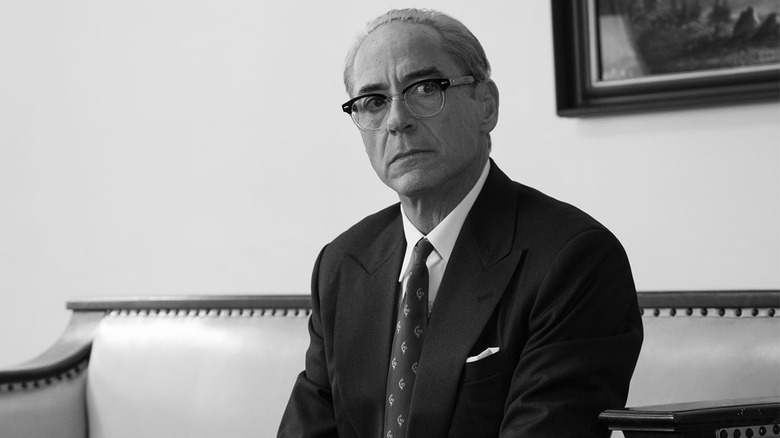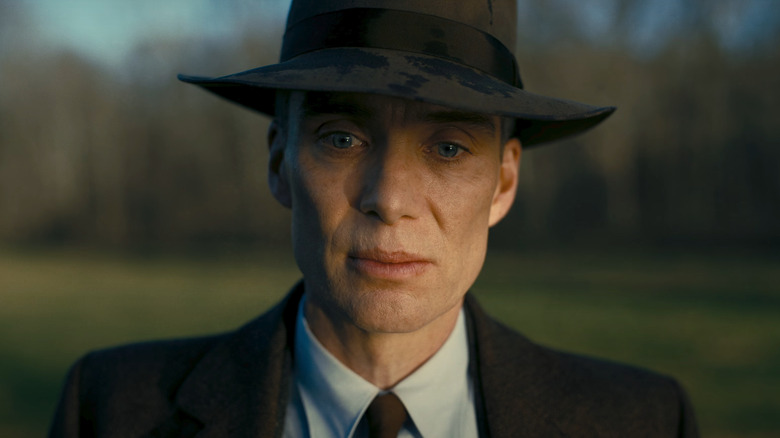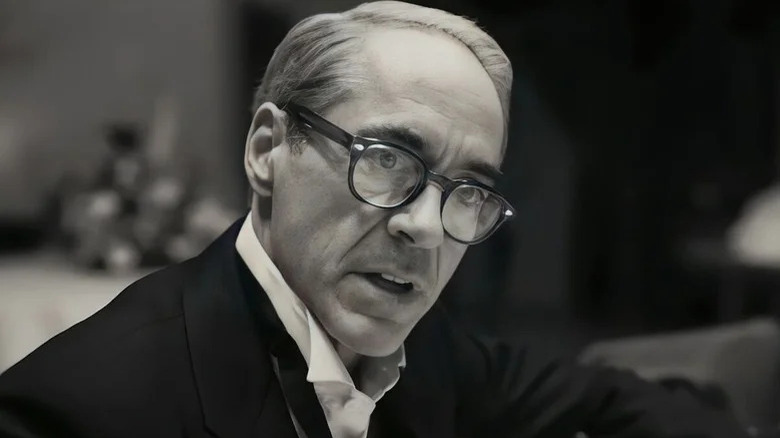Robert Downey Jr. Doesn't Mince Words About The Masculine Forces In Oppenheimer
Christopher Nolan's "Oppenheimer" is a biopic, but if the early buzz is anything to go by, it's also about as taut a thriller as you're ever likely to see. As Emily Blunt, who stars as the titular scientist's wife, told TotalFilm, the "pulse-racing" three-hour epic is "almost like [Nolan has] Trojan-Horsed a biopic into a thriller." Which, considering its dramatic subject matter and the global socio-political tension that characterized that period in history, isn't too surprising.
Aside from recreating a nuclear explosion without using CGI to mimic 1945's infamous Trinity nuclear test, "Oppenheimer" has, by its own director's admission, a bit of a horror element. Although Nolan claims his film "fights against" this "darkness" which emerged during the editing process, that darkness is nonetheless there. And it's not difficult to imagine why.
"Oppenheimer" might be about the father of the atomic bomb, but it's also about the very real existential dread his work at least helped perpetuate, if not outright foster, among the global population. The threat of nuclear annihilation, in and of itself, would be enough to imbue any film with an overwhelming sense of doom. But there's also the fact that this story plays out in the early to mid 20th Century — a time when society still had a lot of progress to make. To be specific, men still very much occupied most positions of power. Whether it's Cillian Murphy's J. Robert Oppenheimer, Matt Damon's Lt. General Leslie Groves, or Robert Downey Jr.'s Lewis Strauss, the people responsible in large part for the creation of the bomb and the mad race to reach nuclear dominance were, of course, men. That's a fact that isn't lost on Downey Jr.
MAD
"Oppenheimer" will, as most Christopher Nolan films do, leave us with plenty to think about. The movie focuses on a controversial figure who, depending on your point of view, is either a hero who helped the West establish nuclear dominance, thereby helping end World War II, or a historic villain responsible for untold suffering and the insane stasis the world finds itself in as a result of so-called "mutually assured destruction" (appropriately shortened to MAD). Look, the guy wasn't even sure when he hit the button to launch the aforementioned Trinity test that it wouldn't cause the complete destruction of the human race — a moment Nolan has spoken about as the fulcrum on which the rest of the movie turns.
Which, if you step back and try to gain even a little perspective, is just plain crazy. And for Robert Downey, Jr., it's not insignificant that most of the people playing this insane game were men. In "Oppenheimer," the former Iron Man actor plays Lewis Strauss, chairman of the US Atomic Energy Commission from 1953 to 1958 and somewhat of a rival to the eponymous theoretical physicist. As the "Oppenheimer" trailers suggest, RDJ remains uncharacteristically stone-faced throughout the film, much of which was likely down to Christopher Nolan pushing Downey Jr. to avoid his more elaborate acting trademarks.
In press interviews, the actor has, of course, turned the charm back on. But the seriousness of the themes his movie explores isn't lost on him. In fact, when he was asked by the Associated Press about how a lot of the movie is "just a lot of men talking," not only did he agree, but he had some thoughts on the subject.
'Men start wars'
In response to the AP, Robert Downey Jr. launched into a brief monologue, saying, "Maybe if more men were listening to each other as opposed to having these petty arguments and in-fighting and trying to get each other destroyed, we'd have more space for a larger dialogue."
The star then went on to extol how Christopher Nolan makes "big-scale big-impact thrilling cinema," that also contains "this exploration of the subtleties of all of us," before returning to his original point, later in the interview by saying, "Men start wars and the entire planet should be a matriarchy. I've never changed position on that."
While that last comment might be a little tongue-in-cheek, RDJ's point about men being focused on destroying each other goes to the heart of the themes in "Oppenheimer." Of course, we'll have to see how delicately Nolan handles these themes when the film arrives on July 21, 2023, but the absurdity of this whole story is bound up in that very fact: that the whole nuclear race was essentially a race to see who could gain the power to destroy everyone else first. The fact that the people in power during this unhinged time in history were pretty much exclusively men isn't insignificant. On the contrary, it might be one of the more significant elements in explaining how we got to that point in the first place.


